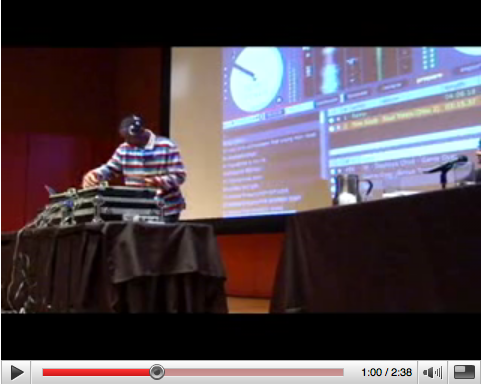Hip Hop & Intellectual Property
Ethics, technology, U.S. Copyright Law, and hip hop culture and music combine to provide us with a timely opportunity to explore the techniques and broader implications of digital music sampling. As the U.S. Court of Appeals has recently noted, “advances in technology coupled with the advent of the popularity of hip hop or rap music have made instances of digital sampling extremely common and have spawned a plethora of copyright disputes and litigation.”
Our academic, scholarly, creative, and technical work across disciplines — at the university, in professional life, and in our communities, in everyday life — is increasingly linked to intellectual property concerns, and we will develop a learning unit together to explore the challenges and opportunities in copyright and fair use contexts that you can use in this course and in your other work. For example, we will consider Paul Butler’s “Much Respect: Toward a Hip-Hop Theory of Punishment” (Stanford Law Review) in the context of criminal justice before applying it to contemporary issues in digital music sampling. The issues that arise in these discussions will undoubtedly appear again in your experiences downloading digital materials online, copying course materials, sharing music, and when incorporating sources into your own work.
Background and context materials
Landes, William M. and Richard Posner. The Economic Structure of Intellectual Property
Law. Belknap Press, 2003.
McLeod, Kembrew with T. Striphas. “The Politics of Intellectual Properties.” Cultural
Studies, 20(2006): 119-144.
Olumfunmilayo B. Arewa, “From J.C. Bach to Hip Hop: Musical Borrowing, Copyright and
Cultural Context.” North Carolina Law Review. 547 (2006).
Rose, Tricia. Black Noise: Rap Music and Black Culture in Contemporary America.
Wesleyan University Press, 1994.
Schloss, Joseph G. Making Beats: The Art of Sample-Based Hip-Hop. Wesleyan University
Press, 2004.
Campbell v. Acuff-Rose Music, 510 U.S. 569 (1994). US Supreme Court.
Michigan Technological University: Academic Integrity Policy.
Michigan Technological University: Computer Use Policy.
For excellent context and materials, “Fair Use and Online Video,” from the Center for Social Media, American University:
Remixes, mashups, fan tributes and other creative work burgeoning in online video often use copyrighted material without permission or payment. When is it fair to do so? In many cases, creators can employ fair use, a key feature of copyright law. Welcome to a code of best practices in fair use for online video, and to studies and other information that help you understand the importance of fair use in maintaining an open door for tomorrow’s creativity. For deeper resources, including teaching materials, background on the law, video examples of fair use in action, and other codes of practice, go to centerforsocialmedia.org/fairuse.
Even though these examples focus on digital video and remix culture, you will find many productive connections to digital music sampling.
Ninth Wonder: The Art of Hip-Hop Sampling at Duke University

